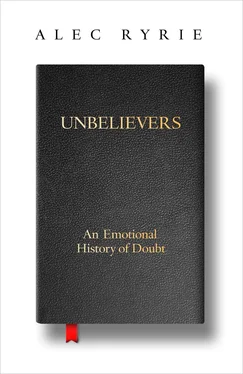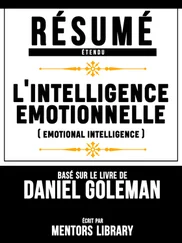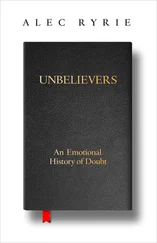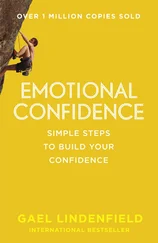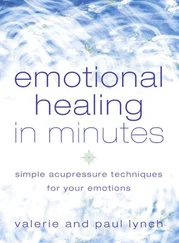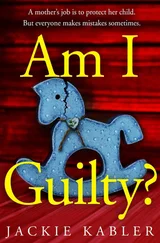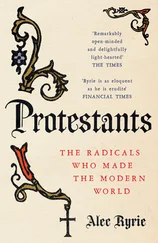He paused and did hold his peace a little space, and shortly after he spoke, saying: ‘I will not say so; I cannot tell; it is a hard question. But, surely,’ saith he, ‘we receive Christ in our soul by faith. When you speak of it other ways, it soundeth grossly, and savoureth of the Capernaites.’ [29]
From a Catholic perspective, his faith was seeping away. From a Protestant one, he was at last seeing beyond crude, faithless literalism to the deeper, spiritual reality. It was the distinction, as George Herbert put it, between looking at glass or looking through it. Herbert, perhaps orthodox Protestantism’s finest poet, was uncharacteristically blunt on the question of transubstantiation. Christ, he wrote, came ‘to abolish Sin, not Wheat / … Flesh … cannot turn to soul. / Bodies and Minds are different Spheres’. [30]That cannot is the heart of the matter. To Catholic ears it is incredulity, binding God’s omnipotence in the weak chains of human reason. To Protestants it is an insistence that the Catholic doctrine fundamentally misunderstands Christ’s sacrifice and drags him down to the filth of humanity.
Protestants were just as ready as Catholics to claim that it was in fact their doctrine which transcended reason and could only be approached through faith. A bestselling early seventeenth-century book of sermons laid out the Calvinist doctrine of Christ’s spiritual presence in the sacrament, adding: ‘Unbelief cannot see how this should be effected: and therefore ignorant unbelieving Papists have invented a carnal manner of eating and drinking the body and blood of Christ.’ Another bestselling handbook of sacramental devotion began with a diatribe against over-rationalisation that could have been lifted directly from a Catholic writer, insisting that to enquire into the manner of Christ’s spiritual presence is to be ‘overwitted in seeking or doubting’, leads into ‘a labyrinth of doubts’, and fosters incredulity and (of course) the error of the Capernaites. [31]
This was more than just knockabout fun. The accusation of incredulity was an invaluable way of explaining why your arguments had failed to persuade the other side. It was not because they were idiots who could not follow a line of reasoning. It was because they were fools, who were saying in their hearts that there is no God – even if they did not realise the fact. Your dispute was therefore not fundamentally about doctrine or interpretation. It was about your opponents’ carnal inability to see the ravishing spiritual vision which was before your own eyes. Defined that way, you could lay claim to an effortless superiority while simultaneously closing down any possibility of further argument. And so the pursuit of ever more authentic faith generated constant accusations of unbelief.
If Protestants diagnosed Catholics as incredulous, Catholics were quick to mock Protestant credulity when they had the chance. In one case, the fire consuming a Protestant martyr smoked a pair of pigeons out of their nest, so that they flew over the stake. The dying man saw them and cried out that the Holy Spirit had descended as a dove. His Catholic denouncers were quick to ask: ‘What blasphemy is this, such opinionative fools to believe or credit such fancies?’ It is part of true faith to know when not to believe. [32]
Such Catholic attacks focused on one issue above all. Protestants took their stand on the Bible, which naturally raised the question of how they knew that the Bible was in fact the inspired Word of God. Protestants were surprisingly reluctant to address this issue directly. This is not because their convictions on the subject were shaky, but because their position depended ultimately, not on arguments, but on faith: an intuitive recognition of God’s Word which, like reason itself, was in the end incommunicable. [33]To claim that you accept the Bible because the Holy Spirit tells you to is to accuse anyone who disagrees with you of not receiving that divine message, and so of unbelief. Catholics were quick to return the compliment.
In the hands of Catholic polemicists like the French Jesuit François Veron, the argument was brutally effective. So, the Holy Spirit teaches you that the Bible is the word of God? Does this inner conviction extend equally to all sixty-six books of the Old and New Testament? To every chapter and verse of them? And to nothing else? Does the Spirit then guide your understanding of it? If so, why do so many other readers interpret it differently? If not, how can it be that the Spirit authorises Scripture but leaves it opaque? And what about the textual glitches and variations between different manuscripts of the Bible? Which is the inspired version? How can you be sure? Has the Spirit told you that too? The purpose of this Catholic argument was of course not to dismiss the Bible, but to prove that the Bible’s authority ultimately derived from the Church, and therefore that all Christians ought to submit themselves to that Church rather than to their own judgement or sense of inner inspiration. But it was much easier to demolish Protestants’ claims about the Bible than to establish Catholic ones in their place. Protestants were not wrong to worry that this supposedly pro-Catholic argument in fact tended to ‘the overthrow of all Religion’. [34]
All’s fair in religious polemic, and we should not take outraged accusations of unbelief too seriously. But this much is true: the Reformation era’s battle for credulity was a high-wire act. To attack your opponents’ doctrines as nonsensical and an affront to reason, while defending your own as incomprehensible and transcending reason, was a heady, exhilarating and dangerous rhetorical achievement. All sides in the Reformation debates were encouraging both credulity and a corrosive scepticism, teaching believers simultaneously to doubt and to loathe doubting. Scepticism was now not the opposite of faith, but a necessary component of it.
‘Doubt Wisely’: From Innocence to Experience
Catholics and Protestants wrote about one another as if they were different species. The reality was much more frightening. They were the same people, and they were liable to convert from one to the other. Every Protestant of the first generation had been raised a Catholic. Battle lines hardened thereafter, but conversions in all directions continued. The Reformation offered believers a religious choice. Most did not want such a thing and stuck to the faith in which they had been raised, but even that was a choice. For Christians who had grown up knowing that choosing is what heretics do, to be forced to choose was itself profoundly disturbing.
Конец ознакомительного фрагмента.
Текст предоставлен ООО «ЛитРес».
Прочитайте эту книгу целиком, на ЛитРес.
Безопасно оплатить книгу можно банковской картой Visa, MasterCard, Maestro, со счета мобильного телефона, с платежного терминала, в салоне МТС или Связной, через PayPal, WebMoney, Яндекс.Деньги, QIWI Кошелек, бонусными картами или другим удобным Вам способом.
